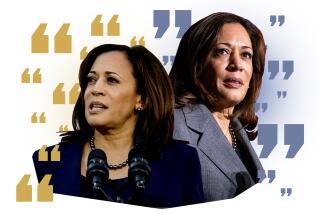Testing Clinton
- Share via
Hillary Rodham Clinton’s opponents for the Democratic presidential nomination demonstrated at this week’s debate that the front-runner is using her assumed inevitability as an excuse for avoiding issues important to the party’s voters. You don’t have to be a Clinton hater to welcome both her opponents’ new assertiveness and the possibility that it will slow the New York senator’s progress toward a coronation.
Neither the party nor the country would be well served by a premature thinning of the ranks of Democratic candidates. Nor, for that matter, would it benefit Clinton if she became the nominee without having had her mettle -- and her past and present positions -- challenged by competitors. Speculation about just that scenario has been inspired by the front-loaded primary calendar and Clinton’s leads in fundraising and the polls.
At Tuesday’s debate in Philadelphia, Clinton seemed to be impatient for the primary campaign to be over so she could turn her attention to the general election. After Sen. Barack Obama accused her of “changing positions whenever it’s politically convenient,” Clinton noted with pride that Republicans have displayed “a constant obsession with me.” Obama cannily countered: “Part of the reason that Republicans, I think, are obsessed with you, Hillary, is because that’s a fight they’re very comfortable having.”
It was more than a deft debating point. Clinton’s unpopularity with many Republicans and independents is a real concern for Democratic primary voters, as are her vote to authorize military action in Iraq and her reliance on campaign contributions from lobbyists -- an issue raised at the debate by former Sen. John Edwards.
An unseemly impatience also was evident in Clinton’s reaction to jousts from her opponents on policy issues. She complained that she was being subjected to a game of “Gotcha!” over her irreconcilable statements about a plan by the governor of New York to provide illegal immigrants with driver’s licenses. But how could her opponents have ignored her equivocation: “I did not say that it should be done, but I certainly recognize why Gov. [Eliot] Spitzer is trying to do [it].”
Especially in this foreshortened primary season, Democrats are entitled to a contest that forces the favored candidate to mix it up and make clear where she stands.
More to Read
Get the L.A. Times Politics newsletter
Deeply reported insights into legislation, politics and policy from Sacramento, Washington and beyond. In your inbox three times per week.
You may occasionally receive promotional content from the Los Angeles Times.










